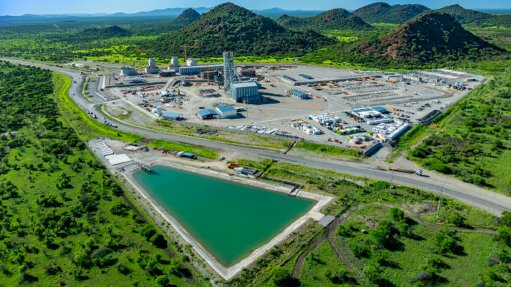Why coal still clings on in renewable energy powerhouse Brazil
CANDIOTA - One of Brazil's last coal plants roared back to life in July after a powerful business group invested millions to keep its turbines turning in the southern mining town of Candiota.
The plant's owner Ambar, controlled by billionaire brothers Wesley and Joesley Batista, is betting that even Brazil, where cheap renewable energy sources produce over 80% of electricity, would not soon stop burning coal, a major driver of global warming.
Brazil, as host of the United Nations climate summit COP30 this month, is urging nations to transition away from fossil fuels. President Luiz Inacio Lula da Silva lamented at a leaders summit in the Amazonian city of Belem this week that the war in Ukraine had led to the reopening of coal mines.
Yet Candiota and five other coal plants still produce 3% of Brazil's electricity, illustrating how pressure from interest groups and lack of a transition plan can keep coal burning, even in a renewable energy powerhouse.
"Brazil absolutely has the potential, with all the solar resources in addition to the hydro and the wind, that it could basically close these coal plants down," said Christine Shearer, who monitors coal for the think tank Global Energy Monitor.
"The strength of the coal lobby, particularly in these coal mining states, is the reason that you see these coal plants sticking around," she said.
The Candiota plant's government contract expired last year, leading local businesses to shut down and many residents to leave town. The plant now sells energy on the spot market, helping to meet demand at peak hours when solar and wind generation fades.
Brazil's Congress and federal government also have thrown a lifelineto coal plants. Last month, lawmakers approved a bill granting contracts until 2040 for plants run on domestic coal, such as Candiota. Lula could still veto it.
NEW AUCTION OPEN TO COAL
The Brazilian government also made coal eligible for a planned capacity auction in March, aiming to boost energy security by contracting thermal plants that can be quickly activated when wind and solar sources are not producing.
Brazil's Ministry of Energy said the additional contracts would make the electric system more reliable, allowing more renewables to also enter the grid.
The inclusion of coal surprised experts, who say coal plants are not quick to start and so lack the needed flexibility.
Critics blame poor long-term planning for continued coal burning even as vast amounts of clean energy go unused due to weak demand and lack of transmission lines. They say this makes the government vulnerable to lobbying from coal and natural gas groups, despite higher financial and environmental costs.
The billionaire Batista brothers bought the Candiota plant before it had a new contract in sight because "they saw a possibility of being successful with their pressure tactics," said Luiz Eduardo Barata, head of the National Front of Energy Consumers, a group critical of government support for coal.
Environmental group Arayara, another critic of Ambar, is seeking to suspend the plant's environmental license in court.
In a statement, Ambar said the coal that fuels its Candiota plant is "secure and widely available to the power system, making it ideal for ensuring supply reliability."
The company denied relying on political influence to secure a new contract for Candiota or plants in its portfolio. Ambar accused critics of representing the interests of large energy consumers at the expense of smaller ones — "regardless of the needs of the power system, the environment or the Brazilian population."
NO JUST TRANSITION
Ambar's work to keep coal alive puts Brazil in the company of countries such as India and South Africa, where powerful interest groups have undermined efforts to wean the energy system off coal, which is key to local economies in places like Candiota.
Shutting the coal plant there could lead to the loss of 10 000 jobs not only at Ambar's operation but at the local mine feeding it and cement factories repurposing its ashes.
Jose Adolfo de Carvalho Junior, who manages a coal mine in Candiota, said the cost of shutting down the region's only industry with quality jobs was not worth it.
"Will turning this off solve the planet's carbon problem? No, it's literally a drop in the ocean," he said.
The uncertain future of the plant has residents on edge about their livelihoods, said Graca dos Santos, who was fired from the plant after it lost government contracts.
The life of the plant "needs to be extended so that a just energy transition can happen," she said. "It's not fair to leave an entire population without work."
Lula's government has no transition plan for Candiota and has not made much progress on plans for other coal plants.
The Candiota region's beef, wine and olive oil sectors could employ coal workers with some retraining, said Joao Camargo, who founded a seed producers cooperative.
"They didn't create any condition for the transition," he said.
The head of the local coal miners' union, Hermelindo Ferreira, pointed at maps showing areas that would lose industrial activity and jobs if the Candiota plant shuts down.
Still, confidence in coal's long-term prospects is slowly fading in Candiota, he admitted. Some workers have already moved to nearby towns in search of better employment.
Even as he fights to save jobs, Ferreira said he is urging colleagues to learn new skills. He has earned a certification for maintenance on towers measuring wind speed, hoping the wind power industry will invest in the region.
"You don't put all your eggs in one basket," he said.
Article Enquiry
Email Article
Save Article
Feedback
To advertise email advertising@creamermedia.co.za or click here
Announcements
What's On
Subscribe to improve your user experience...
Option 1 (equivalent of R125 a month):
Receive a weekly copy of Creamer Media's Engineering News & Mining Weekly magazine
(print copy for those in South Africa and e-magazine for those outside of South Africa)
Receive daily email newsletters
Access to full search results
Access archive of magazine back copies
Access to Projects in Progress
Access to ONE Research Report of your choice in PDF format
Option 2 (equivalent of R375 a month):
All benefits from Option 1
PLUS
Access to Creamer Media's Research Channel Africa for ALL Research Reports, in PDF format, on various industrial and mining sectors
including Electricity; Water; Energy Transition; Hydrogen; Roads, Rail and Ports; Coal; Gold; Platinum; Battery Metals; etc.
Already a subscriber?
Forgotten your password?
Receive weekly copy of Creamer Media's Engineering News & Mining Weekly magazine (print copy for those in South Africa and e-magazine for those outside of South Africa)
➕
Recieve daily email newsletters
➕
Access to full search results
➕
Access archive of magazine back copies
➕
Access to Projects in Progress
➕
Access to ONE Research Report of your choice in PDF format
RESEARCH CHANNEL AFRICA
R4500 (equivalent of R375 a month)
SUBSCRIBEAll benefits from Option 1
➕
Access to Creamer Media's Research Channel Africa for ALL Research Reports on various industrial and mining sectors, in PDF format, including on:
Electricity
➕
Water
➕
Energy Transition
➕
Hydrogen
➕
Roads, Rail and Ports
➕
Coal
➕
Gold
➕
Platinum
➕
Battery Metals
➕
etc.
Receive all benefits from Option 1 or Option 2 delivered to numerous people at your company
➕
Multiple User names and Passwords for simultaneous log-ins
➕
Intranet integration access to all in your organisation





















